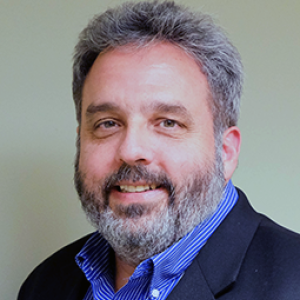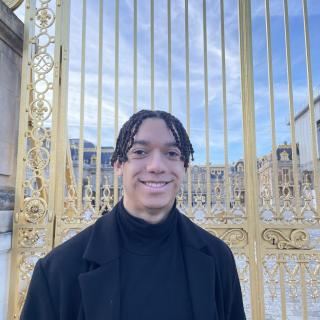IES Abroad: Reflecting on your time with IES Abroad in Durham during the 1980-81 academic year, what were some of the most impactful experiences or lessons that shaped your academic and personal journey? How did studying abroad contribute to your current role as a professor of Islamic world studies at DePaul University?
Warren Schultz (WS): Looking back, it is not overstating to say that the IES Abroad Durham year changed my life’s path. In the semester before departing for England, I had changed my undergraduate major and had no inkling as to what I would do post-graduation. The Durham year was also my first time out of the United States, and thus the beginning of that fish out of water experience that often comes with study abroad. Those nine months in northern England were filled with personal growth as well as a growing awareness of the world beyond where I had grown up. While other participants from that year may be shocked to read this, it also contributed to a new level of maturation.
IES Abroad: In your role as a professor, you've specialized in the history of the Islamic world studies. How did your time abroad in Durham influence or inspire your academic focus? Are there specific moments or insights from your study abroad experience that continue to resonate in your teaching and research today?
WS: While in Durham, I ended up in a year-long course on Islamic Civilization which had three interwoven components of history, religion, and literature. Everything I learned was new, often exciting, and usually challenging. The instructors were inspiring. As it turned out, I was particularly drawn to the history track. That was the beginning of the path that led me to become a professor of Islamic history. Of course, at the time I had little idea of how that path would go nor of the twists and turns that happened along the way, but 14 years after leaving Durham I was an assistant professor of history at DePaul University in Chicago.
IES Abroad: Many alumni find that studying abroad fosters a global perspective and a deeper understanding of cultural diversity. How has your international experience in Durham influenced your approach to teaching and engaging with students in a culturally rich field like Islamic world studies?
WS: Without a doubt, my IES Abroad Durham year and all that has happened afterward made me a devoted advocate for study abroad experiences and why I donate to IES Abroad. From my first year at DePaul, I became involved in our college’s study abroad programs and eventually designed and led or co-led 14 short-term study abroad programs. I also fundraised for student fellowships and participated in program governance issues. This latter led to helping colleagues plan and develop their own programs as well as working to ensure that such efforts were appropriately recognized. I consider these activities among the most enriching of my career.
I also remember that one reason I chose the Durham program was my sense that there was no language barrier. (I soon learned how naïve that assumption was.) Nevertheless, my time in Durham was punctuated by trips to other places in Europe, and when I returned I was convinced of the importance of language acquisition. I have since encouraged undergraduates to study languages other than their own. On study abroad programs, this also meant my collaborators and I included brief language units to stress the importance of how just an acquaintance with the host language and culture can have such an impact on the travel experience.
IES Abroad: Durham has a unique historical and cultural backdrop. How has your time in Durham, both within and outside the classroom, contributed to your appreciation and understanding of cultural nuances, particularly in the context of your work in Islamic world studies?
WS: Durham was and is such a historic place. There are physical and linguistic reminders of it everywhere. And this is also true for many places. I did not know that then but the fact that I do now is because of my time in Durham. Experiencing a few months in northern England during the early Thatcher years was the start of a lifelong process of learning (and remembering!) that personal experience is not universal. Experiencing the ups and downs of culture shock—that is not how you pronounce "aluminum"!—make you examine your own assumptions of normativity. Knowing yourself and your assumptions may enable you to engage with other people rather than just reject them as different or wrong. I think that experience has percolated throughout my teaching. DePaul is a diverse place, and on top of that every year I am even older than the majority of the students in my courses. I strive to keep that awareness of difference in mind whenever I enter a classroom. It would be exaggerated to claim that every course resembles a study abroad experience, but there are parallels.
IES Abroad: As an accomplished professional, what advice do you have for current and future students interested in pursuing a similar academic path or in delving into the field of Islamic world studies? How can a study abroad experience, like the one in Durham, serve as a valuable foundation for their academic and career pursuits?
WS: I advise students to be open to the reality that in addition to the things that we know and that we don’t know, there is also that huge category of things we don’t even know that we don’t know. Study Abroad is an opportunity to learn about and even dive into those unknown unknowns. Take the time to prepare for your travel—read and study your destination on your own—but be flexible enough to recognize that some earlier-made plans may need adjustment once you reach your destination. Remember that in many situations, the only thing you can control is your own reaction. While fun, study abroad experiences put you in a crucible of challenges that can be difficult to go through. Reflecting upon those experiences and what you learned from them is not only an opportunity for personal growth, it also allows you a response to an interview question about your study abroad experience with a more thoughtful response than that “you had a good time.”






